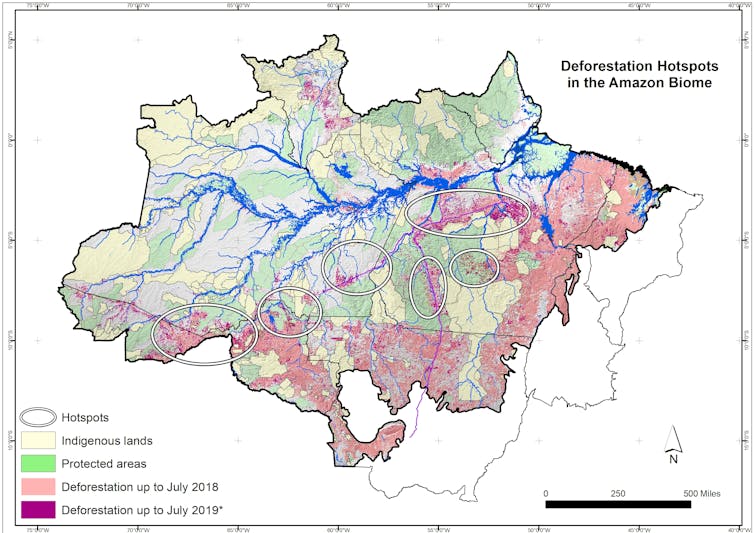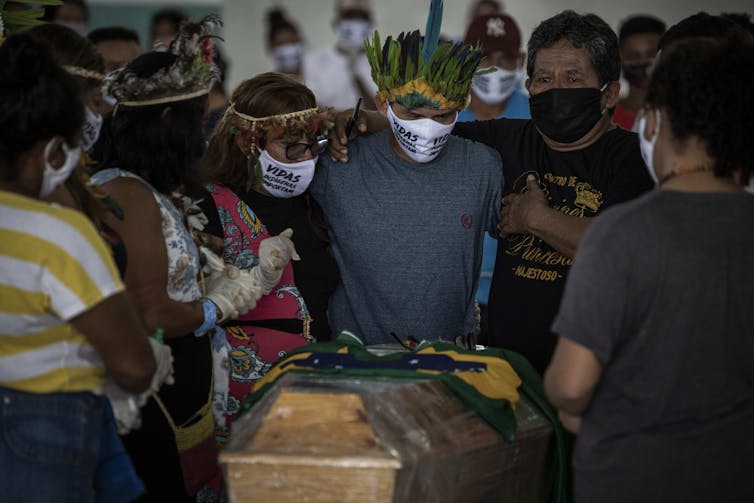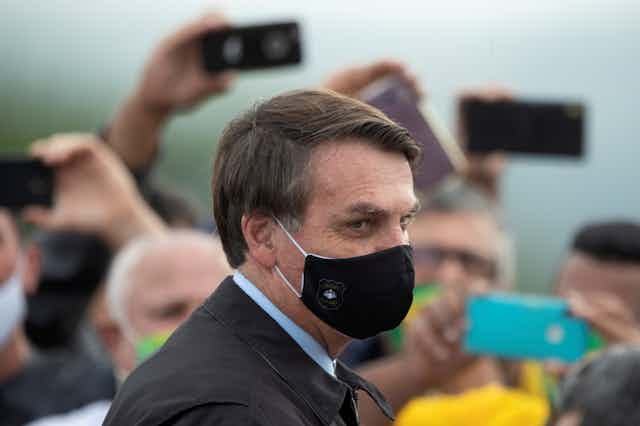The Amazon fires of 2019 drove the greatest single year loss of Brazilian forest in a decade. But with the world in the grip of a pandemic, forest loss in 2020 is already on track to dwarf the devastation of a year earlier. In April 2020 alone, 529 square kilometres of forest was destroyed – an increase of 171% on April 2019.
And worse may be on the way. In order to clear deforested land for farming, felled trees are burned. According to Ane Alencar, director of the Department of Science at the Institute of Environmental Research of the Amazon, “this was the main ingredient of the 2019 fire season, a story that could be repeated in 2020”.
The smoke that engulfed cities in Brazil during the 2019 Amazon fires caused widespread breathing problems. As cases of COVID-19 grow by the day – even in remote areas of the Amazon – Brazil risks exacerbating the public health crisis and causing lasting harm to the forest and indigenous communities.
Emboldening illegal activity
On May 22, the Federal Justice ordered the government to establish bases for environmental inspectors in hotspots of felling and burning. These are areas in the Amazon where 60% of all deforestation occurs.
This was intended to restrict the criminal market that drives illegal logging and mining, but also to help reduce the spread of the virus to indigenous people in the region.

But Jair Bolsonaro’s government appears set against the aims of the prosecutors. With attention turned to the health crisis, the Minister of the Environment, Ricardo Salles, sacked Olivaldi Azevedo as director of the federal environmental inspection agency, IBAMA, in April.
Azevedo’s dismissal is thought to be linked to his unwillingness to stop an anti-mining operation on indigenous lands in the interior of Pará. The successful raid resulted in the burning of equipment used by illegal miners, with images of the arrests broadcast on Brazil’s most popular news channel.
These miners form a loyal base of support for Bolsonaro, hence the government’s irritation. But the television broadcast also featured people who had occupied indigenous lands to build farms. One of those interviewed made it clear that their incursions were encouraged by the speeches of President Bolsonaro and his Environment Minister, Salles.
It’s illegal for non-indigenous people to trespass on Brazil’s indigenous lands. But people eager to exploit the natural riches of these territories often claim support from the president, who recently promised to decrease the amount of land that is protected. In the interview, the trespassing farmer said “the people are with this hope, this expectation, that one day it happens … Meanwhile, we are occupying here”.

An opportunity amid crisis
During the recent surge in deforestation, the Brazilian government reduced the budget for the environmental inspection agency IBAMA by 25%. The government also replaced two of the agency’s chiefs with a military policeman from São Paulo, Walter Mendes Magalhães Junior, who was previously accused of releasing timber exports without the necessary license.
We interviewed Ricardo Abad from the Socio-environmental Institute (ISA), a leading non-governmental organisation in Brazil, who said “the dismissal of Ibama’s inspection coordinators sends a message that organised crime is liberated in the Amazon and punishes those who work to combat illegal activities.”
Read more: Are the Amazon fires a crime against humanity?
Brazilian legislation allows inspectors to burn confiscated machinery from loggers and miners. This equipment is often expensive, and so its destruction greatly undermines criminal operations in the forest. It’s a tactic that President Bolsonaro has reportedly condemned. In 2019, the destruction of seized equipment fell by half compared to the previous year.
Many of the recent setbacks in Brazil’s environmental policy could be explained by a video that was released by court order on May 22. The video shows a meeting between Bolsonaro and his ministers from a month before, in which environment minister Salles suggests the government take advantage of press attention being focused on the pandemic to relax regulations in the Amazon.

Failure to control environmental crimes doesn’t only threaten the forest though. It also increases the vulnerability of indigenous peoples to COVID-19. A recent study found that indigenous lands that aren’t formally demarcated let in intruders much more easily, preventing these communities from isolating from the disease. Of the 1,005 cases of COVID-19 confirmed among indigenous people living in the country, there have been 44 deaths, with 41 in the Amazon, the region with the lowest number of intensive care units in Brazil.
The Brazilian Amazon may be on the eve of a catastrophe. COVID-19 could decimate indigenous communities, while the government response paves the way for profiteers to further degrade their lands and the forest. Bolsonaro’s legacy may be one of the highest national death tolls during the pandemic, and a point of no return for destruction of the Amazon.

